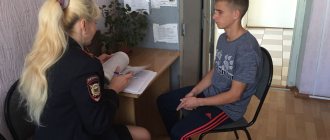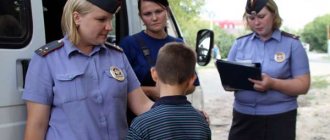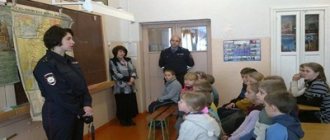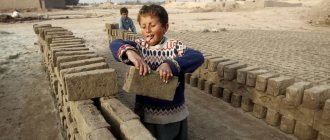For most citizens who are not familiar with the names of all government organizations, the abbreviation PDN can have absolutely any meaning (even income tax). In some cases, even the ubiquitous Internet can give an unexpected answer to the request: “road slab, buy at a good price, Minsk, Grodno.”
The decoding of the abbreviation PDN (or KDN) is simple - commission for minors. Considering the role this organization plays in the life of society, it is worth knowing more about it. Civil service, a separate branch in the work of the Ministry of Internal Affairs, which celebrates its 100th anniversary in 2022. Created almost simultaneously with the formation of the Soviet government, the commission is still actively working on the education and re-education of citizens under 18 years of age. At the same time, in order not to get confused in matters of jurisdiction of government bodies, it is important to understand what the responsibilities of the inspector of such a commission are.
Juvenile affairs inspector: duties and rights
What is PDN in the police? The decoding is simple - in juvenile cases. The duties of such an inspector mainly include preventive conversations with the aim of preventing crime among children and adolescents.
The juvenile affairs inspectorate also monitors illegal actions among them. Such inspections are part of the Ministry of Internal Affairs system, and differ in their level of subordination:
- Municipal, city, district;
- Department of Internal Affairs and Administrative Entities;
- Transport divisions.
PDN inspectors at schools and other children's institutions conduct cases in which all offenses are recorded. This information will be transmitted in the future to military registration and enlistment offices and higher educational institutions.
The powers of inspectors include not only collecting information and conducting preventive conversations. In cases of serious crimes, he has the right to send the child to special closed institutions (isolation centers, special schools).
The inspector’s responsibilities also include legal protection of teenagers who are inclined to commit criminal activities.
As for the prevention of deviant and criminal activity, it applies mainly to minors:
- Drug users;
- Released, pardoned;
- Those who broke the law;
- Those accused of criminal activity, but who are at large;
- Those in need of rehabilitation after release;
- Conditionally sentenced and sent to correctional labor.
It is also important that careless guardians often have a negative impact on their charges. And the traffic police inspector must also work with them to reduce such influence.
Main functions
The main function is to ensure the most effective preventive measures to combat juvenile violations.
Law enforcement agencies work with minors who have already violated the law. Violations can be punishable either by the administrative code or by criminal law. There are age restrictions in the country. If a child is under a certain age, then they do not have the right to hold him accountable.
According to the law, legal liability is established for citizens over sixteen years of age , and in rare cases over 14 years of age. It all depends on the severity of the crime. If a minor was drinking alcohol on the street and was discovered by the police, he will be detained and registered.
Many children are detained for fraud. Due to age restrictions, there is no punishment for the offense and the only way to combat similar acts in the future is to register the individual. The state agency works with minors who were caught consuming alcohol and psychotropic substances.
Also, a minor can commit a criminal offense, but the court cannot make a decision. In this case, the offender is required to register. The authority works with minors who have been assigned educational measures. If the verdict establishes a suspended sentence, then it is also taken into account by the state authority.
Not only a child, but also the whole family can be registered - especially if it is disadvantaged. If the older generation has already been involved and the persons have neglected their responsibilities, then the whole family is registered. This option is practiced in cases of liability due to drinking and abuse of alcoholic beverages, or involving children in illegal activities.
PDNs work with minors and prevent crimes. The main task is to reduce the crime rate. If a minor has engaged in illegal activities, a commission for interaction with teenagers will work with him.
The commission is a collegial structure, which includes representatives of the settlement administration and the police. The commission includes psychologists and school administration, assistant prosecutors who are responsible for working with children, and representatives of government agencies involved in guardianship. If a minor is arrested for a crime, a police officer draws up a report and sends it to the commission for detailed study. After 10 days, she formulates a decision outlining the motivation for the withdrawal and notes the need to register the person with the PDN.
As part of the procedure for registering children in the PDN, the person responsible for the offense and the parent responsible for it are invited. The inspector's job is to listen to the positions of all parties. The commission's decision, taken at the end of the hearing, is sent to the police for command, where administrative staff issues a visa or refuses consent.
When the document is approved, the decision is sent to the PDN, where a personal card is created that contains maximum information about education, family circumstances, behavioral characteristics and personal characteristics. From this moment on, the child is registered, which means that the state station begins preventive measures.
Work of a traffic police inspector
Since it is very important to psychologically influence a teenager in order to conduct preventive conversations, the inspector must win him over. Therefore, they often see mainly women in this position. Children feel more relaxed around them.
It is important that the inspector explains everything to them in a language they understand, but in compliance with legal aspects. But the parents of offenders must be explained all the legal nuances of their children’s actions and the possible legal consequences.
Since one of the most important tasks of a PDN inspector is to establish contact with children and explain the great importance of education to their parents or guardians, it is important that he has psychological and pedagogical training. But the basis should be a specialized legal education.
The inspector must not only stop crimes, but also find out the reasons why the teenager committed them.
Isolation Center
If the PDN inspector and other persons responsible for the child determine that it is impossible to help the adult in any other way, they may decide to send him to the CVNP. This abbreviation refers to special centers created for those under 18 years of age. They are designed to temporarily isolate teenagers who break the law. Such institutions are strictly closed. A child over 14 years old can be placed here. They make such a decision only if no softer options work. The duration of stay in the institution is up to 30 days.
Sometimes the court decides to send a child here if he was previously sent to a closed institution for study, but the minor ran away. The reason may be actions that threaten other children. Those who are homeless and have no place of permanent residence or relatives are sent to the Center for Refugees. If it is impossible to establish the identity of a child over 14 years of age, he is also sent to the Center for Children's Rehabilitation.
How are cases filed against minors?
There are a number of legislative documents on the basis of which PDN inspectors work:
Have a question for a lawyer? Ask now, call and get a free consultation from leading lawyers in your city. We will answer your questions quickly and try to help with your specific case.
Telephone in Moscow and the Moscow region: +7
Phone in St. Petersburg and Leningrad region: +7
Free hotline throughout Russia: 8 (800) 301-39-20
- Federal Law No. 120;
- Criminal Code of the Russian Federation, chapters 14 and 20;
- Code of Criminal Procedure of the Russian Federation, chapters 73, 420, 421;
- Penal Code of the Russian Federation, articles 183, 187-190;
- Administrative Code, Articles 5 and 20.
Specifically, the process of registering a case includes the following stages:
- Registration of a suspect’s registration card and file;
- Collection of explanations from the parties to the conflict, crime;
- Collection of materials;
- Drawing up an act on the child’s living conditions;
- Collection of data, certificates about work with the child and his parents and guardians;
- Characteristics for the child.
Based on the results, a conversation is held and a document is issued on the case and the work performed. Control over the teenager in the future also falls on the shoulders of PDN inspectors.
After six months, parents can apply to remove the teenager from the register, provided that he has no new offenses.
Is it possible to avoid registering a child with the CDN - recommendations for parents
Parents who are not indifferent to the fate of their child must in every possible way convince the specialist not to register the child.
You can achieve this by relying on characteristics taken from the class teacher, the coach in the section where the child goes, and even neighbors.
It’s worth talking to the commission employee first - suddenly the teenager’s offense is not so serious, and you can “get off” by talking with him.
In cases where registration is unavoidable, parents must:
- Come to the commission on the appointed day.
- Provide characteristics, certificates, awards that the child has in order to form a positive opinion about him among the commission’s specialists.
- Form a positive opinion among the employees of the Children's Supervision Center about yourself as a parent, assure and convince the specialists that the violation committed by the child will not happen again and you will help him correct himself.
You can only get registered after repeated or serious violations , so they may not focus on an isolated case. Usually a conversation is held with the child and parents.
Remember some important nuances:
- If the KDN made a decision with which you do not agree, then within 10 days you can appeal it through the courts.
- You can deregister a child after six months. To do this, you should write a written appeal in free form, indicating that the child has improved and does not need supervision from specialists.
- Members of the commission can themselves remove the child from the register if he no longer breaks the law.
- Adult citizens are automatically deregistered.
- Those who have served a suspended sentence are removed from the register after the specified period.
So, now you know what to do if your child is registered.
If the family was registered, then the parents can be provided with a certificate from work, a written request from the guardianship and trusteeship authorities, neighbors stating that they are fulfilling their obligations.
How to become an inspector?
Each inspector is assigned to a specific territory. The size of this territory is determined by the head of the department of the Ministry of Internal Affairs to which the inspector belongs. He is briefed on the state of affairs in the given territory.
According to the order of the Ministry of Internal Affairs No. 845, the following documents are required to apply for the position of PDN inspector:
- Citizenship of the Russian Federation;
- Military ID;
- Legal or pedagogical education;
- Medical examination;
- Relatives have no criminal record.
Legislative regulation of activities
All decisions of the KDN are based on specific acts of Russian legislation. This is the following:
- Constitution of the Russian Federation.
- International treaties, international agreements that have been ratified by Russia.
- Federal, constitutional laws of the Russian Federation.
- Acts of the Government, the Russian President.
- Provisions on CDN and ZP.
- Regional laws and acts.
Inspector rights
Legal inspector:
- Call the teenager and his representative for a conversation;
- Ask questions regarding the child and his actions;
- Take the teenager to the police for three hours for a personal search.
The inspector records all cases in a special journal. Files are stored for three years. Then they are kept in the archive for another two years. After this they are destroyed.
Log data is used to track the teenager in the event of a repeat crime.
Russian KDN system
Analyzing what KDN is, let’s consider the composition of the system of these institutions in the Russian Federation:
- Government Commission on the Affairs of Adolescents and Children, Protection of Their Legal Rights.
- Commissions that are created at the behest of the highest state executive power of the constituent entities of the federation. They are called upon to carry out their activities within these regions (regional control centers).
- Commissions that are established by the local government system. They operate within a municipality. Among them are regional ones in rural areas, urban ones, and regional ones within the same city.
About information
Another option for decrypting PDN is personal data. This abbreviation is used more often as ISPDN - personal data information system. It is a complex of information in a certain database, as well as the means and technologies through which the accumulated information is processed and stored. The system includes automation or can do without such tools.
Every IPDN has some level of protection. The fourth category involves publicly available information, the third – personal information, thanks to which a person can be identified. The second group is data, thanks to which you can not only identify a person, but also obtain some additional data about him (but not included in the first category). Finally, the first category is information about race, nationality, political views, religious beliefs, and philosophical views. This includes the state of health and personal life of the person.
All systems are divided into groups according to the amount of data processed through them. The third category is systems through which information of thousands of subjects or fewer is processed. The second category of volume is dealing with a number of subjects from one thousand to one hundred thousand. Finally, the first is the one that specializes in simultaneous work with information about one hundred thousand or more people.
Final part: road surface
Another option for deciphering the abbreviation PDN is road slab. Such elements are widely used in the construction of road surfaces. They are used to arrange paths of various types and shapes. The use of PDN slab helps to reduce the construction time of the facility and reduce the complexity of the work. The result is considered to be of high quality. As the manufacturers of PDN slabs assure, such a road covering system ensures a long service life even in difficult operating conditions. In our country there are many enterprises specializing in the production of such slabs, which is why they are used in the construction of roads in various settlements.
PDN slabs, created specifically for working on road surfaces, have become more widespread in recent years than before. This is due to improved technologies for creating such products - they have become more durable and reliable. It is believed that road slabs are perhaps the best option for road construction in difficult climatic conditions (for example, in the Far North). Some brands are more suitable for construction within a populated area, others are more often used when working on access roads. There are special varieties designed for temporary roads and industrial areas. Our country produces road slabs that cope well with increased loads, which allows them to be used at helicopter and airfields. There are special standards that regulate the quality of such elements.







